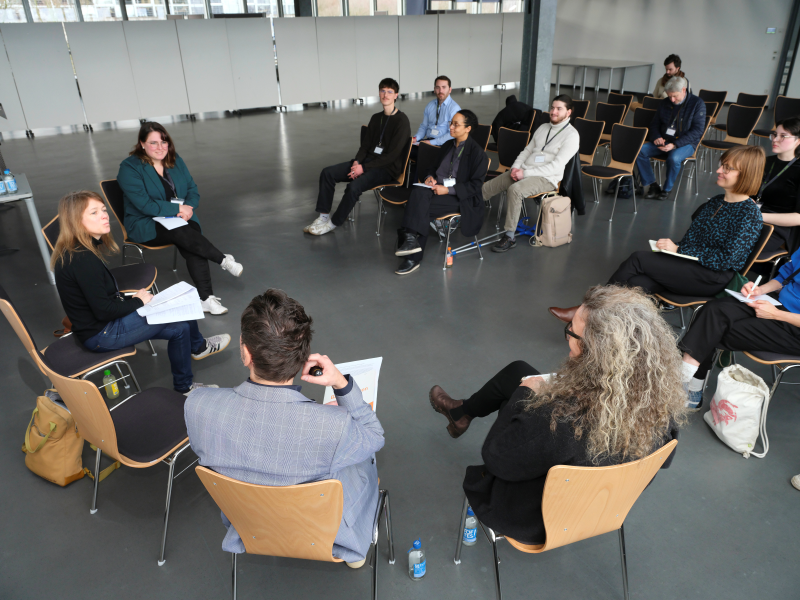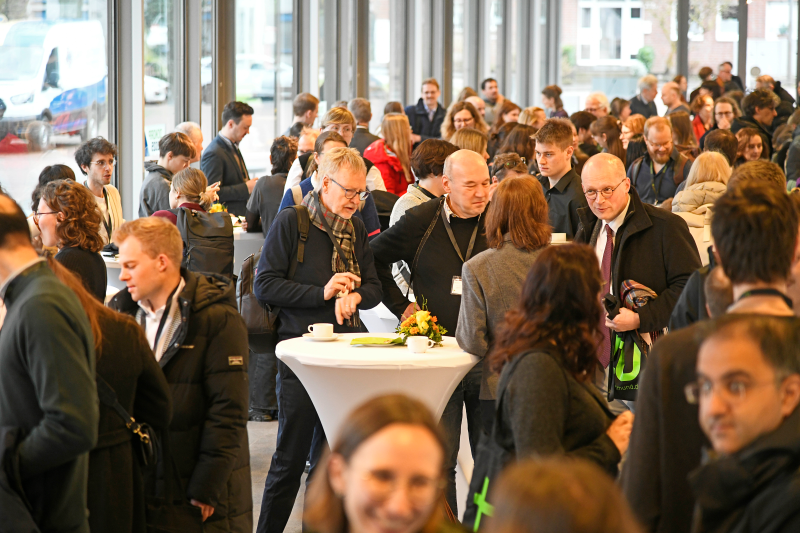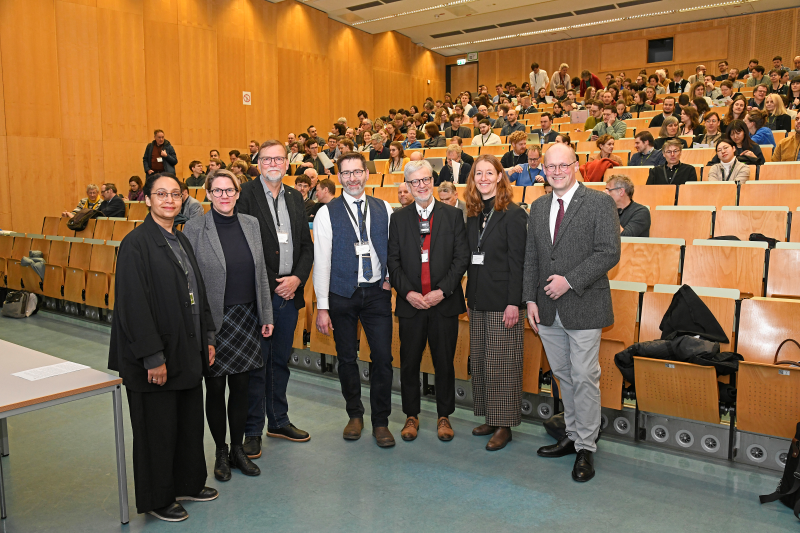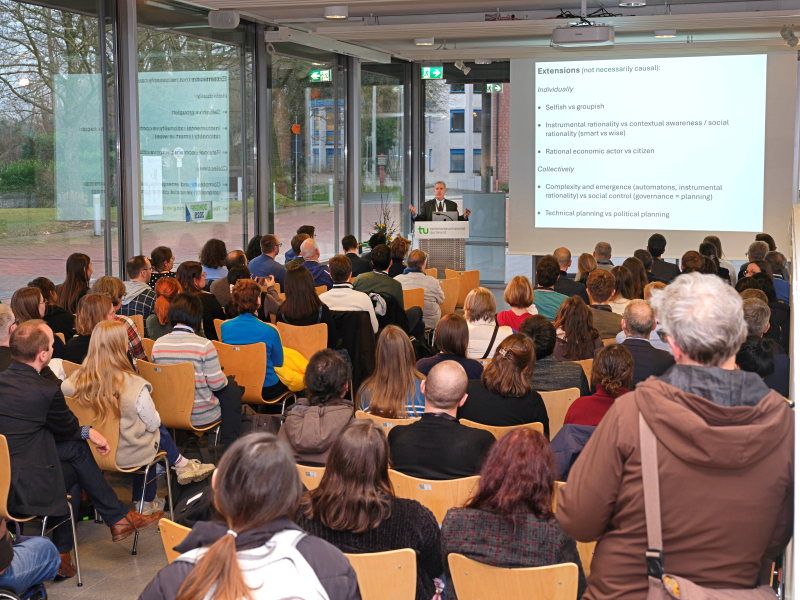Published on: 30. August 2024
DOKORP 2025: “Planning in times of multiple crises“
ILS mit großer Beteiligung auf der DOKORP 2025
Wie können wir Städte gerechter und nachhaltiger gestalten? Welche Rolle spielt Raumplanung in Zeiten von Klimakrise, Wohnungsnot und sozialer Ungleichheit? Diese Fragen standen im Mittelpunkt der 7. Dortmunder Konferenz Raum- und Planungsforschung (DOKORP), die im Februar 2025 an der TU Dortmund stattfand. Unter dem Titel „Grund zum Planen in Zeiten multipler Krisen“ kamen rund 380 Expert*innen aus Wissenschaft und Praxis mit Studierenden zusammen, um über zukunftsfähige Planungsstrategien zu diskutieren.
In 225 Beiträgen wurden innovative Konzepte und Forschungsergebnisse zu Bodenpolitik, nachhaltiger Stadtentwicklung und resilienten Planungsansätzen vorgestellt. Ein besonderes Augenmerk lag auf der Bedeutung des Bodens als begrenzte Ressource – ein Thema, das auch in den Keynotes von Prof. Dr. Richard Norton (University of Michigan), Prof. Dr. Dr. Ortwin Renn Soziologe und Assoc. Prof. Heidi Falkenbach (Aalto Universität) vertieft wurde.
Neben Fachdebatten bot eine Exkursion des RVR praxisnahe Einblicke in Dortmunder Transformationsprojekte wie die Kokerei Hansa und den Innovationsstandort Phoenix-West. Ein Highlight war zudem der PhD-Tag, der Nachwuchswissenschaftler*innen die Möglichkeit bot, ihre Forschungsarbeiten zu präsentieren und sich mit erfahrenen Expert*innen auszutauschen.
Organisiert wurde die DOKORP 2025 von der Fakultät Raumplanung, der ARL – Akademie für Raumentwicklung in der Leibniz-Gemeinschaft und dem ILS. Das ILS war auch durch die Organisation von Sessions und mit Vorträgen intensiv am inhaltlichen Austausch zu verschiedenen Themen wie Quartiersentwicklung, Zukunft der Innenstädte, Klimaanpassung, nachhaltige Gewerbeflächenentwicklung, Mobilität und Erreichbarkeit oder räumliche Gerechtigkeit beteiligt.
Wir danken allen Teilnehmenden, Vortragenden und Organisator*innen für ihre wertvollen Beiträge und blicken gespannt auf die DOKORP 2027!
The 7th Dortmund Conference on Spatial and Planning Research will take place from February 10 to 12, 2025 at TU Dortmund University.
DOKORP 2025 is fully booked, registration is no longer possible.
The Dortmund Conference on Spatial and Planning Research is jointly organized by the Department of Spatial Planning at TU Dortmund University, the Academy for Territorial Development in the Leibniz Association, Hanover (ARL) and the Research Institute for Regional and Urban Development (ILS), Dortmund.
Topic of the conference
“When we think of planning, we usually think of shaping the future in advance. But the future is and remains unknown, even if it is planned. In the complexity of planning, we seek a kind of certainty that the future cannot offer.”[1]
Planning practice implicitly presumes relatively stable basic conditions: urban development is predictable, property is robust, institutions are stable, the financial system works, and geopolitical and environmental conditions remain largely stable. Within spatial planning methods and techniques are applied which alleviate uncertainty and predict future population development, traffic flows, or flood events as precisely as possible to provide the basis for long-term plans.
The current crises are challenging the foundations of such an assumption of stability and predictability. The 2008 economic crisis questioned growth-oriented spatial planning, natural disasters question land use designations in risk areas, the pandemic has called into question fundamental assumptions about the use of public space. However, after a brief period of shock, stability returns. For example, after the flood events between 1993 and 2021, only a few building areas were actually withdrawn. Planning – it seems – is not changed by crises. It is robust and therefore creates stability and planning security. Is planning unshakable and not adaptable?
Currently crises are occurring more and more frequently and simultaneously: climate crisis, energy crisis, housing crisis, looming wars, migrations, pandemics, social inequalities, radicalization of milieus – these are multiple crises that spatial planning can and may not ignore.
What does this mean for planning? How can planning be justified in times of multiple crises? How can planning act in the face of uncertain futures? After all, most coping strategies for crisis require more space: the pandemic requires more distance for “social distancing”, migration needs housing, wars destroy urban areas and landscapes and require more military areas, rivers need more space for dealing with floods. The Building Land Commission recommends active land policy for German municipalities, at the same time, land consumption shall be reduced, public infrastructure should facilitate different forms of mobility in a just way. In short: planning also needs space. These spaces is owned by various landowners. The recognition and consideration of diverse interests and human and non-human perspectives increase complexity.
The Dortmund Conference on Spatial Planning 2025 deals with such fundamental questions of planning with discussing planning in times of multiple crises.
[1] Luhmann, N. (2011). Organisation und Entscheidung. Wiesbaden: VS, Verl. für Sozialwiss. p. 231
Keynotes
- Assoc. Prof. Heidi Falkenbach
Professor of Real Estate Management in the Department of Built Environment, Aalto University - Prof. Dr. Dr. Ortwin Renn
Sociologist, economist and sustainability scientist - Prof. Dr. Richard Norton
Professor of Urban & Regional Planning, University of Michigan
Übersicht Beteiligung ILS-Wissenschaftler*innen DOKORP 2025
Monday, 10.02.2025
Dienstag, 11.02.2025
Mittwoch, 12.02.2025
Tracks
Track 1: Multiple crises seen through the lens of international comparative planning research (GER/EN)
Track 2: Planning theory (GER/EN)
Track 3: “Rethinking spaces and spatial development – planning in uncertain times” (GER/EN)
Track 4: Housing and Land Policy (GER/EN)
Track 5: Urban development in times of multiple crises (GER/EN)
Track 6: Toleranz, Demokratie und Inklusion – Quartiere als Orte des Zusammenhalts? (GER)
Track 7: Data-based Spatial and Urban Planning in the Digital Era (EN)
Track 8: Green and Blue Infrastructure (EN)
Track 9: Mobility and transport (GER/EN)
Track 10: Masterplanning for change: Designing adaptable cities and neighbourhoods (EN)
Track 11: New paradigms for more complexity (GER/EN)
Track 12: Marginalisation and planning in times of multiple crises (EN)
Track 13: Braucht die Energiewende die Raumplanung noch? (GER)
Track 14: Planning for resilient cities and regions in a changing climate. Objectives, players, risks and promising strategies. (GER/EN)
Track 15: Open PhD-Workshop (GER/EN)
Track 16: Call for Roundtable Proposals (GER/EN)
You can also find further information here.
PhD Tag | 10.02.2025
Am Vortag der DOKORP laden wir alle promovierenden Teilnehmer*innen zu einem gemeinsamen Workshop ein. Der Workshop richtet sich an alle Doktorand*innen, unabhängig von dem Stadium ihrer Doktorarbeit.
Besonders in Zeiten von multiplen Krisen ist auch der Promotionsweg durch Komplexität und Interdependenzen gekennzeichnet und erfordert eine hohe persönliche Resilienz. Die Fähigkeit sich an Unerwartetes anzupassen ist somit ein zentraler Anspruch an zukünftige Forschungsarbeiten, die stärker denn je von inter- und transdisziplinärem Vorgehen geprägt sein werden. Ziel des Workshops ist es, Doktorand*innen die Möglichkeit zu geben, ihre Forschungsideen, -ergebnisse und -probleme in einer informellen Atmosphäre mit anderen jungen Wissenschaftler*innen auszutauschen. Dies wird durch unterschiedliche, austauschorientierte Formate ermöglicht, die sowohl Inhalte als auch Methoden thematisieren.
Am Vormittag möchten wir mit Euch Eure Methoden diskutieren, am Nachmittag Eure Inhalte.
DOKORP-Exkursion | 10.02.2025
Am Vortag der DOKORP wird auch eine Exkursion zu zwei Zukunftsstandorten in Dortmund angeboten. Start ist gegen 13 Uhr am Dortmunder Hauptbahnhof mit einem Reisebus zur Kokerei Hansa.
Die Kokerei Hansa steht als industriekulturelles Highlight für gelungenen Strukturwandel. Sie ist einer von 27 Ankerpunkten der touristischen Route Industriekultur im Ruhrgebiet; Standort der regionalen Route Ruhrgebiet der European Route of Industrial Heritage (ERIH); und einer der fünf Zukunftsgärten der Internationalen Gartenausstellung (IGA) 2027. Thomas Reichling, Amt für Stadterneuerung der Stadt Dortmund, führt uns über das Gelände und berichtet zum aktuellen Stand der IGA-Vorbereitungen.
Gegen 15.30 Uhr wechseln wir zum zweiten Standort, Phoenix-West.
Auf Phoenix-West zeugt der stillgelegte Hochofen des ehemaligen Stahlwerks Phoenix noch vom einstigen Metallindustriestandort, der heute als Technologiepark Phoenix einer der wichtigen Innovationsstandorte Dortmunds ist. Auf Phoenix West sind mit der MST.factory (Mikro- und Nanotechnologie) und dem ZfP (Zentrum für Produktionstechnologie) gleich zwei Kompetenzzentren des TechnologieZentrumsDortmund (TZDO) vertreten. Dirk Stürmer, Geschäftsführer des TechnologieZentrumsDortmund (TZDO) wird uns vor Ort zur historischen und aktuellen Entwicklung des Geländes berichten.
Zum Abschluss kehren wir in die Räumlichkeiten der Bergmann Brauerei ein und lassen den Abend dort ausklingen (auf Selbstzahler-Basis).
Rückfahrt erfolgt eigenständig mit ÖPNV, z.B. über Bahnhof Hörde (U41 in die Dortmunder City, Dauer ca. 12 min.).
Die Dortmunder Konferenz Raum- und Planungsforschung wird von der Fakultät Raumplanung der Technischen Universität Dortmund gemeinsam mit der Akademie für Raumentwicklung in der Leibniz-Gemeinschaft (ARL) und dem Institut für Landes- und Stadtentwicklungsforschung (ILS) veranstaltet.
Modified on: 20. November 2025









